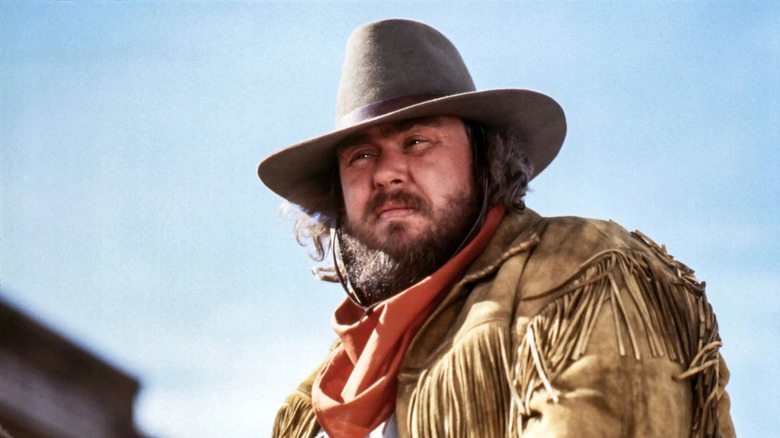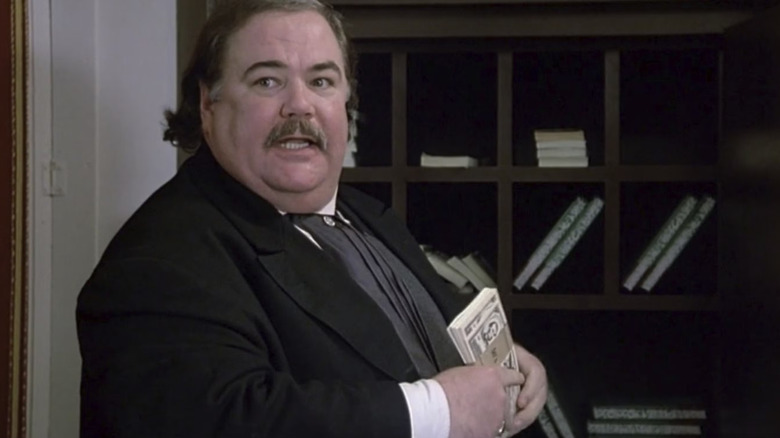John Candy's Penultimate Film Was A Western Flop With A 0% Rotten Tomatoes Score
John Candy passed away on March 4, 1994, at the age of 43, having died from a heart attack. Candy had a history of heart issues in his family and spent portions of his life struggling with alcoholism and tobacco and cocaine usage. He was taken far too soon, as Candy was a charismatic, funny, talented comedian with dazzling movie star qualities. He died in Durango, Mexico, where he was filming Peter Markle's unremarkable Western comedy "Wagons East!," a film in which Candy starred opposite Richard Lewis.
"Wagons East!" was an inauspicious exit for Candy. The film was released only five months after Candy died, and it was a horrible box office bomb, earning only $4.4 million. What's more, it was terribly reviewed, racking up the rare and unenviable 0% approval rating on Rotten Tomatoes (based on 30 reviews). Roger Ebert gave it one half of a star, calling it one of the least amusing comedies he had ever seen. Rita Kempley, writing for The Washington Post, described it as "ghastly," and "puerile swill." Weirdly, Candy didn't play a comedic character and instead served as the story's straight man. The other characters were all broad, slapstick clowns, and at least one of them (played by John C. McGinley) was a walking homophobia gag. The film also starred Ellen Green, Candy's co-star in Frank Oz's musical comedy "Little Shop of Horrors," as well as Robert A. Grant, William Sanderson, and contemporary "Star Trek: Voyager" actors Robert Picardo and Ethan Phillips.
The saddest part is that Candy didn't even want to do the film. He didn't like the script and was only forced into making the movie because of a contract stipulation. It seems that back in 1990, Candy was gearing up to star in the John Hughes film "Bartholomew v. Neff" opposite Sylvester Stallone. Hughes, however, got cold feet after his 1991 movie "Curly Sue" underwhelmed at the box office. This caused "Neff" to fall apart, leaving Candy stuck with a contract he had already signed and left with no choice but to star in "Wagons East!"
Wagons East! was completed with CGI and body doubles after Candy's death
The premise of "Wagons East!" is cute: It's the 1860s and a group of settlers has finally made a home in California after a dangerous trek across the continent. They quickly find, though, that they are definitely not cut out for frontier living and make the wise decision to return to St. Louis. They then hire a guide named James Harlow (Candy) and point their wagons east. Harlow, however, is a hopeless alcoholic and he keeps leading the wagon train accidentally astray. It eventually comes to light that Harlow also led the ill-fated Donner Party, and he drops out of the wagon train.
"Wagons East!" is structured as a slapstick anti-Western, declaring that the Old West is terrible and that it would have been better if settlers had stayed in New York. It won't surprise you to learn that the film's screenwriter, Matthew Carlson, wrote "Wagons East!" after moving from New York to Los Angeles and becoming disillusioned with L.A.'s broken promises of fame (a phenomenon alluded to in the film's Washington Post review).
The script had to be re-written during production to accommodate Candy's death, and some of Harlow's scenes were completed with CGI or body doubles. Although "Wagons East!" was the last film Candy ever shot, it was actually the second-to-last of his films to be released in theaters. His final movie, Michael Moore's satirical comedy "Canadian Bacon," was filmed in 1993 but didn't hit the big screen until 1995.
It should also be recalled that Candy was in debt at the time of "Wagons East!." In 1991, Candy, Bruce McNall, and Wayne Gretzky banded together to purchase the Toronto Argonauts, a Canadian football team. The team did well enough, but Candy still owed $1 million as a minority stakeholder. "Wagons East!" was a contract gig for Candy and nothing more. It would have paid off his football debt.
The studio behind the film, Carolco, received an insurance payout upon Candy's death of over $15 million. It was the only way to earn anything back for the horrid dud. As Ebert noted in his review, it was a sad way to end Candy's career.

